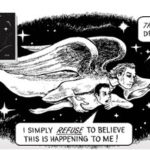Finding The Edgy In Christian Fiction
 What is your definition of “edgy Christian fiction”?
What is your definition of “edgy Christian fiction”?
For many it is a story that contains sex and/or cussing. While violence is generally accepted, graphic gore would be considered edgy. Horror is also edgy, especially if it contains the aforementioned gore. Another common edgy element is magic or anything smacking of paganism.
The list could go on. The most restrictive Christian publisher, Steeple Hill (an imprint of Harlequin), as late as November of 2009, had a whole list of terms and situations to avoid as too edgy for their audience. Today, while still retaining restrictions, they’ve dropped a lot of that list and have loosened up a bit.
But is this really the definition of edgy Christian fiction?
To answer that, we’ll first define “edgy” in this context.
Daring, provocative, or trend-setting.
American Heritage Dictionary
Daringly innovative; on the cutting edge.
Dictionary.com
Having a bold, provocative, or unconventional quality.
Merriam-Webster
The above list might be provocative for some Christians and therefore daring and bold for the author and publisher, but trend setting? Innovative? That train left a long time ago in the general market.
There’s the catch. Like last week’s post on conversion scenes, what any one person considers edgy will be subjective based on their experience and beliefs. Consequently, it is the audience in general that determines what is edgy for them. What is edgy for a CBA bookstore patron will be viewed as mild and quaint for a majority of Barnes & Noble patrons. Sometimes for a majority of Christians too.
In last week’s comments, Lyn Perry mentioned the following:
My niece who writes Christian women’s fiction included a damn in her book, an organic expression from a character who was failing in life but eventually got back on the road to restoration. A reviewer marked her book as one star saying there were vulgarities in it!
For that reviewer, having a character say, “damn” in a book is edgy. For many Christians and a host of non-Christians, they wouldn’t even blink.
Yet, there is still a problem. Depending on which side of the edgy fence one sits on, the above definition of edgy Christian fiction paints “edgy” as a negative. When people hear “edgy Christian fiction,” they either see it as more realistic fiction or immorality invading Christian fiction. It is like a tug-of-war between the two camps.
My take? Both sides are focused on the wrong edge.
The above list of edgy issues are primarily edgy to Christians. That is the wrong audience to define edgy Christian fiction that we should strive for. I’ll let Jesus sum it up.
Blessed are ye, when men shall hate you, and when they shall separate you from their company, and shall reproach you, and cast out your name as evil, for the Son of man’s sake. 23 Rejoice ye in that day, and leap for joy: for, behold, your reward is great in heaven: for in the like manner did their fathers unto the prophets.
(Luke 6:22-23 KJV)
We are called to be edgy. Not to fellow Christians, but to the general market. How?
By dealing with issues the general market considers edgy using a Christian worldview in a realistic manner. Issues like rape, adultery, premarital sex, marriage, dating, substance abuse, wife abuse, ministerial abuse, homosexuality, politics, greed, earthly authority, or insert your favorite sin. The list is long.
True, dealing with some of those issues may necessitate being edgy to Christians as well. The point is if we are only edgy to Christians, then we’ve missed the blessing Jesus gave us. If we are only edgy to Christians, then we’ve really played it safe and said little. Cussing and sex is not edgy in the general market.
What truly edgy Christian fiction have you read of late?










































I agree. Edginess should really be from the perspective of the world saying, “Whoa, that’s a take on an issue that we hadn’t thought of.” Trouble is, most of us don’t have anything that ‘different’ from the world to say.
Wow, never thought of it this way.
Reminds me of that verse: “The Word of God is a two-edged sword…”
So, when we take divine revelation from the Bible and apply it to “edgy” real-life issues, that’s, well, edgy.
I guess part o f the problem is this whole CBA/non-CBA division. If you are marketing your books to the CBA market, then the violence/sex/cussing stuff is edgy, I guess. If you are marketing them to non-CBA, then the whole “Christian perspective on the world’s failings” idea is edgy. But….do either of these types of “edgy” books actually get published in the markets the author is hoping to publish in? This is what I struggle with. I haven’t started to send my MS out to agents, editors, etc yet, but I am unsure as to who to send it to. I think it fits more naturally within the Christian fold but I’m not sure CBA publishers will want it, not because of violence/sex/cussing but because of the fact that, due to the time setting (early Middle Ages) most of the faith portrayed is of a “Catholic” variety, which often is a turn-off to the typical audience of the CBA publishers. So….I’m thinking that my best bet will be an independent publisher. I’ll guess we’ll see what happens when I start sending it out.
It just strikes me as really, really, facepalming sad if Catholicism is supposed to be edgy, especially medieval Catholicism. Haven’t they been the definition of “orthodox” in western Europe/the Americas for at least the last thousand years?
Granted, my parents knew some Baptists who were utterly convinced that Baptist-ism was the most legit form of Christianity by seniority as well as proper theological stance (Dad heard one claim that there have always been Baptists since John the Baptist and hahahahahaha, no.)
Yep. I had Accelerate Christian Education’s church history course. It didn’t quite condone that view unequivocally, but it definitely promoted the idea that there have always been secret Baptists camping out in the backwoods throughout Christian history.
Also, Protestant tradition is almost as suspect as Catholicism. My church history course identified the Reformation as the “Church of Sardis” from Revelation, “dead” and apostate because of state sanction and because the work of reformation was left incomplete. I’ve known Baptists who flat-out denounced Protestantism.
This has always left me burned and empty, because I’ve always had a sentimental sense of history and tradition. As a child I felt awed to walk on ground that the Iroquois lived on and that American Revolution was fought on. I’ve always wanted to be able to see the glory of an ancient religious tradition, but Evangelicals always try to kill this desire.
Excuse me, I have to suppress the urge to slam my head against a wall. I might be prepared intellectually to accept that Baptists are very capable of creating cognitive dissonance, but I am not necessarily emotionally prepared for the cognitive dissonance itself. I swear, only Mormons and Catholics are weirder about collecting orthodoxies.
Everyone is capable of collecting orthodoxies (see the comments thread on TrekMovie.com for a prime example). The fact that we’re more familiar with some doesn’t make others any less prone to this universal human trait. Also, as I pointed out in my below comment, it’s not a trend in all Baptist congregations (which are not in lockstep like a collective, nor are Catholics or even Mormons).
Should I have put that under a #personalobservation hashtag? I’m not denying that people in general are weird about this, but in my opinion, Baptists, Mormons, and Catholics (broad stereotype: does not apply in all cases) are extra-weird about this because they pick some WTF battles to fight. Though I’m well aware that there are other kinds of Baptist than Southern Baptist, but the Southerns are the ones that blanket the ground where I live (and they seem pretty convinced that they are the most legit form of Baptist-ism, possibly also by seniority but I haven’t asked). After all, the Slacktivist is a Baptist.
What did them thar Bayuptists call that again? The “trail of blood”?
(Checks) Yes, I was right.
Apparently someone thought about the Catholic “we can trace the popes all the way back to the Apostle Peter” concept, “If you can’t beat ’em, join ’em.”
bainespal, I am so sorry you went through such a form of instruction. While there has always bee a strain of anti-Catholic views within Protestantism (from the beginning: it was, after all, a revolution), I must point out that the beliefs you’ve named are in no way relegated solely to Baptists, and in fact there are many Baptists and other Evangelicals who would be as surprised as I was upon hearing about them (the anti-Protestant one is rather odd, rather paradoxical).
That being said, it is true that there have been Anapbatists recorded in history as early as the Elizabethan era, if not prior to that. I say that not to claim these were Baptists in the sense one might suppose today (Baptists, like Catholics, and all other denominations have gone through changes), but to point out that the concept of “prior to Luther there were only Catholics” is as flawed a view as the ones you’ve named.
While I’d say there were some flaws in the facts, I am heartened to know you at least received instruction in church history. I think a major problem in the church today (across the board) is a lack of knowledge regarding even basic church history and doctrine.
Technically, it was a reformation. 😉
I’m surprised that you’re surprised. My church is quite conservative and exclusivist, but it doesn’t teach or endorse that kind of Baptist exclusivity. The Christian school I attended didn’t specifically endorse those views either, although it used ACE course materials that did, and a few students belonged to fundamental King James Only churches. (The people I mentioned who denounced Protestantism were the KJV-only folks at my Christian school.) So, I don’t feel that these super-exclusive teachings are normal among Baptists, but I do feel that they are rather common.
I know. There were proto-Protestants like Wycliffe. More importantly, the historical church wasn’t necessarily Catholic as we now know it. Protestants have an equal claim to the tradition of the Western Church. (And the non-Western Christian traditions are just as ancient and orthodox.) It’s the Evangelicals dedicated to tearing down liturgy and converting all traditional Christians who are killing Christian heritage.
And I know, #NotAllEvangelicals. But it seems like many, many Evangelicals are guilty — a great deal of the Evangelical zeitgeist has been anti-tradition for a long time.
Hence, reformation? 🙂
Glad to hear you’re in a good church scenario. I’ve attended little country churches most of my life, so I suppose I’m out of it when it comes to some things. In my own denomination of Free Will Baptists, I’ve never heard anyone teach (either in the local congregation or the state convention) that Baptists were the only one ones with God’s ear (though, I suppose, our Arminianism would suffer a bit with that idea).
So if you write for Christians, you should write for your grandmother. Anything edgy should be sent to the secular market, where it should somehow manage to be Christian enough to convict people and yet still be publishable. It’s not like Christians might want to read books that aren’t for grandmothers or anything.
Problem is that it puts people like me completely out of the loop. I don’t need to be converted, and I want to read things that have more meat to them than grandmother fiction and yet still are Christian. I keep getting the sense that Christian culture doesn’t know what to do with a guy like me; they’d be happier if I either got a sex change and started writing and reading girl-in-dress YA fantasy, or “manned up” and loved sports, coaching, and non-fiction.
It’s frustrating.
I finished a book recently that, as I was reading I thought repeatedly, “I love how realistic this book is – but I bet she offended a slew of Christian readers because of it.” and sure enough, one glance at the reviews has readers up in arms over so many piddly silly things.
The best I’ve read this year is certainly Guy Stanton III’s “The Warrior Kind” series of five. They are action/adventure, science fiction, fantasy, romances of the most outrageously “Christian” heroes and heroines I’ve ever had the good fortune to read. He’s still offering them free [I think because he’s just learning this whole self-publishing thing]. There’s some problems with homonyms, for example.
But the stories? Incredible, wonderful, joyous, and thrilling. I finish reading one of his books and I walk around like one of David’s mighty men for a day or so. Great fun.
He’s got another series of six called “Agents of Good”, also free. not quite as good, but very close. Urban fantasy, mission impossible kind of stuff, but great rollicking fun, and thrills. Coupled, of course, with a strong, Godly romance between strong men and women who aren’t afraid to be righteous or to kill bad guys.
I call him the Christian Clive Cussler. No serial fornicators, just strong heroes and heroines, of various races and cultures, falling in love, serving the Lord with gusto.
Thanks for the recommendation: I’ve downloaded the first book.
And thanks for actually answering Mr. Copple’s question: I appreciate it. 🙂
Denominational differences aside–not that they’re unimportant, but I’d rather focus on ‘mere Christianity’ for these sorts of discussion– I think that a better term is needed for ‘edge.’ Not ‘original,’ or ‘new’, but ‘authentic,’ maybe? No, that term is so overused as well.
Passionate, maybe? To quote one Christian author “write the story that makes you burn with holy fire…you can’t not write it.” I’ve read some stories where I know the author was writing from their heart, from a story that they had to tell, and not to follow the market or cash in on a trend. If you’re writing a story like that, it probably won’t be perfect or even avoid all cliches, but there will be something in it that is worth saying.
I’m currently chugging through the entire Dresden Files series, and I’m 99.9% convinced that the author is some flavor of Christian. One does not write such a Christian worldview, and fill books with so much hope, without being a Christian.
Yet he’s writing for the secular arena, so his books have all kinds of dirty things in them–sex vampires, seductive fairies, monsters that rip people apart and eat them–as well as the hero who admires supernatural females and struggles with lust. In the book I just finished, he also had a problem with rage issues, after seeing kids get mauled by ghouls.
And there’s constantly this theme of choice. No matter how bad things are, you always have a choice to do the right thing, even with a demon in your head, trying to lead you astray. There’s been some fantastic sermons (in a secular market book!) about God working his will through the saved and unsaved, and whether it’s possible for a man to serve God without specifically adhering to a religion.
It’s been a long time since I’ve read a book series that uplifted me this much. Every single book is better than the last, as if each book he pushed the Christian message envelope a little further. It’s absolutely wonderful.
Dresden Files? Did you just read my mind? I wanted to bring that up, but I wasn’t sure if it would fit . I know the book was mentioned briefly in a post a few years ago, but do we have any plans for a post on the series itseslf? And if not, would the powers that be here accept a post on the Dresden Files if I submit it?
I just finished Skin Game last week and it has one of, if not the, best portrayal of a Christian character in any speculative fiction. Micheal Carpenter…well, explaining his epic-ness would involve a great deal of spoilers, but he is a good man, a great friend to the protagonist, and pretty much every word from his mouth in Skin Games was exactly what was needed for the situation and good without being safe…..
Edit: After checking, I did find one post from 2011, referring to Micheal as a stable character, but I think the more recent books provide additional insight into his character and I’d really like more discussion of the series. I mean, we have urban fantasy, spiritual warfare, ‘good’ wizards, and all sorts of other elements that we don’t see much in Christian fantasy, but are worth looking at.
Julie: I wish somebody would give the Dresden books their due! It’s all the “edgy” mixed with unapologetic handling of Christianity, God, angels, Fae, gods, vampires, everything. Heck, book 9 had me rolling, when Harry finds out Thomas’s new job. Such a kind handling of a touchy subject.
The part in Small Favor where (SPOILER) Micheal asks Harry about his blasting rod (Spoilers) moved me so much I copied it into my notebook. And then again when I re-read it later.
And so many different kinds of characters. Ivy. Marcone. Micheal. Mac. Uriel. Lash….
“The novelist with Christian concerns will find in modern life distortions which are repugnant to him, and his problem will be to make these appear as distortions to an audience which is used to seeing them as natural; and he may well be forced to take ever more violent means to get his vision across to this hostile audience. When you can assume that your audience holds the same beliefs you do, you can relax a little and use more normal ways of talking to it; when you have to assume that it does not, then you have to make your vision apparent by shock — to the hard of hearing you shout, and for the almost blind you draw large and startling figures.”
–Flannery O’Connor